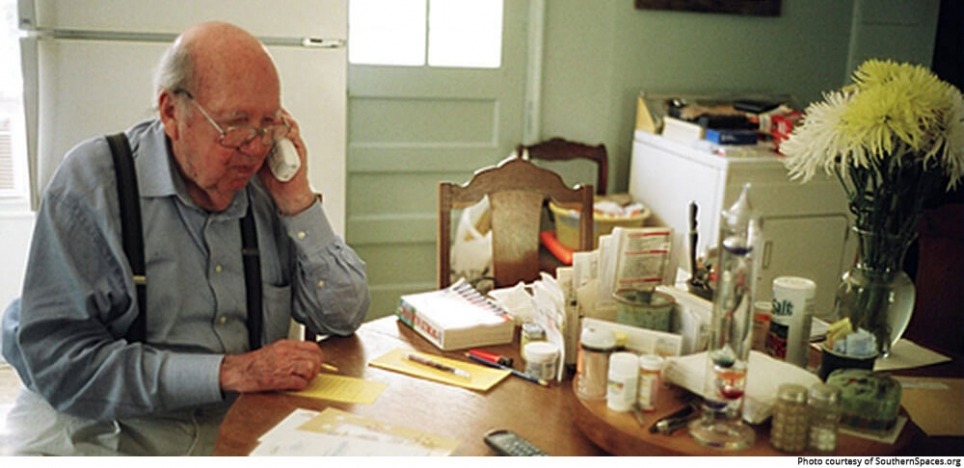Will D. Campbell (1924-2013) inspired, challenged, and edified us with his expansive talents and vision. He became known as a civil rights activist, a renegade preacher, an iconoclastic writer, and a minister without a church who presided at weddings, baptisms, and funerals for a band of unruly souls that included Johnny Cash, Willie Nelson, Jules Feiffer, and Studs Terkel.
This country boy attended three colleges and graduated from Yale Divinity School. After serving as a Baptist minister in a southern parish for two years, he became the director of religious life at the University of Mississippi. He later served as a race relations troubleshooter for the National Council of Churches from 1956 to 1963.
He was one of the few white people who escorted the "Little Rock Nine" into Central High School. His work as a behind-the-scenes bridge-builder between the races resulted in him being the only white in attendance when Martin Luther King, Jr., founded the Southern Christian Leadership Conference. He also joined the Freedom Riders in 1961 and accompanied Dr. King for the marches in Birmingham in 1963 and in Selma in 1968.
Perhaps the most startling example of his faith was his ministry of reconciliation, a phrase he took from 2 Corinthians 5:18. Campbell firmly believed that social change does not come only through legislation and government-sponsored initiatives. Enduring and heart-felt racial justice is the result of genuine reconciliation between people who have hated or been at odds with one another.
Campbell walked his talk and came under heavy criticism for visiting racist James Earl Ray in prison after he assassinated Dr. King in 1968. Frequently asked to sum up the Christian message, he quipped, "We're all bastards, but God loves us anyway." Whereas many liberal Christians could not bring themselves to embrace such an inclusive view of divine grace, Campbell went even further by saying of the poor southern whites who filled the ranks of the Ku Klux Klan, "They have been victimized one step beyond the black. I'm pro Klansmen because I'm pro-human being." It was this vision that led him to be called "the chaplain of the Ku Klux Klan.
In his later years, Campbell campaigned to stop the war in Vietnam, to abolish capital punishment, and to establish equal rights for women and LGBTQ people. Former President Jimmy Carter characterized this unconventional minister as "a social activist in service of marginalized people of every race, creed, and calling."
To Name This Day . . .
 Books
Books
Read in Campbell's books or from his articles and interviews available online. What aspects of his unconventional ministry speak to you and to our times? Here are some lessons that stand out for us.
* Brother to a Dragonfly by Will D. Campbell is a vivid and mesmerizing spiritual diary containing a mix of memories, portraits of interesting people, accounts of personal tragedies, and many meaningful vignettes. This extraordinary paperback was a finalist for the 1977 National Book Award; Time magazine named it one of the 10 most notable works of nonfiction of the 1970s.
If we were to choose one motto we've learned from Campbell, it would be: "If you're gonna love one, you've got to love them all."
After working hard to win freedom for blacks, Campbell decided to minister to Klansmen and other bigots. Here's how he explained this move: "I had become a doctrinaire social activist, without consciously choosing to be. And I would continue to be some kind of social activist. But there was a decided difference. Because from that point I came to understand the nature of tragedy. And one who understands the nature of tragedy can never take sides."
* Soul Among Lions: Musings of a Bootleg Preacher is a book of meditations or "bubblings from the depths of one man's soul." Campbell covers a wide variety of subjects, saying important things about race relations, flag burning, ethnic cleansing, legislated morality, the killing of children, and more. Here are some examples of how Campbell disturbed the comfortable in the name of God.
He tells a story about a time he had to debate the death penalty with a well-known scholar:
"He gave a lengthy and learned statement on why he favored it. I was embarrassed because I had no prepared remarks. So I said. "I just think it's 'tacky,' " and I sat down.
"That led to confusion as to just what 'tacky' meant. Well tacky means ugly, no style, no class. I didn't win the debate, but I do believe that America as a nation has too much class, too much character, and too much style to go on sinking to the crude level of death practiced in executions. So for the sake of our own soul, let's just cut it out."
In this excerpt from the book, Campbell offers a solution to "houselessness":
"Let every congregation adopt one person who lives on the streets. Ask no questions as to the worthiness of these people. Who among us is worthy? Just find them lodging, a job, friends — give them hope."
 Films
Films
Watch the film God's Will directed by Michael Letcher and narrated by Ossie Davis; it is available for free viewing on Vimeo. This 60-minute profile of the life and ministry of Will D. Campbell (1924-2001) was produced by the Center for Public Television at the University of Alabama.
